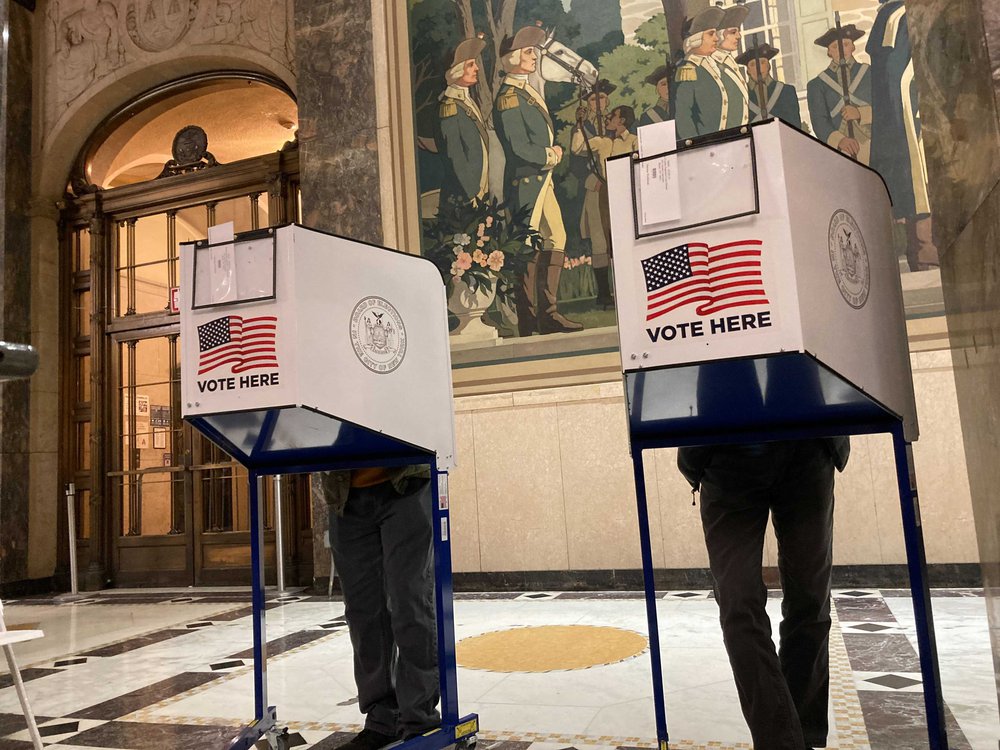Republicans File Lawsuit To Block New York City’s Noncitizen Voting Law
Jan. 10, 2022, 4:23 p.m.
The plaintiffs argue that this expansion of the electorate is illegal under the state constitution and state election law, and will “dilute the votes of United States citizens.”

Voting at the Bronx County Courthouse on November 2nd, 2021.
Republican leaders are making good on a threat to fight a recently enacted New York City law extending voting rights to noncitizens in local elections. It would allow more than 800,000 people living and working in the city legally to register and vote in city elections starting in 2023.
In a complaint filed Monday in Richmond County State Supreme Court, the plaintiffs, led by Staten Island Borough President Vito Fosella, argue that this expansion of the electorate is illegal under the state constitution and state election law, and will “dilute the votes of United States citizens.” The complaint also says the new law would force the plaintiffs who are elected officials to change the way they campaign and may hurt their chances of winning future elections.
“We vowed to use every legal tool in our arsenal to block this unconstitutional and un-American law, and that’s exactly what we’re doing,” Nick Langworthy, chair of the New York State Republican Party and a plaintiff in the case, said in a press release announcing the lawsuit.
“It’s really an open and shut case,” said Neil Murray, one of the attorneys for the plaintiffs, and a Democrat, he noted. “The Constitution of the State of New York is very straightforward: citizenship is a prerequisite to voting, not just in statewide elections but in city elections as well.”
Other plaintiffs included State Conservative Party Chairman Gerard Kassar, Congressmember Nicole Malliotakis, the five Republican members of the New York City Council along with other state elected officials from Staten Island and four voters who are naturalized citizens. City Council member Robert Holden, a Democrat from Queens, is also a plaintiff.
They are suing Mayor Eric Adams, the New York City Council and the New York City Board of Elections, which would be required to implement the law.
Despite raising some earlier concerns about the bill, Adams made clear this weekend that he is standing behind the legislation. He issued a statement on Saturday evening that said members of his administration had allayed his concerns about the bill’s 30-day residency requirement ahead of the bill becoming law. Then he went further on Sunday during an appearance on CNN where he said it was, “imperative that people who are in a local municipality have the right to decide who's going to govern them.”
On Friday, Adams nominated Sylvia Hinds-Radix as the city’s new Corporation Counsel. Since 2012, she has served as Associate Justice of the New York State Appellate Division, Second Department. As head of the City Law Department, her office would be responsible for defending the city. Her appointment must still be approved by the City Council.
Asked about the new lawsuit, the mayor’s office said the city will not back down.
“The administration intends to vigorously defend the law in court,” said José Bayona, a spokesperson for City Hall.
The noncitizen voting bill is a historic step in the right direction toward affirming the enormous contributions of immigrants in New York City and nationally.
— NYC Immigrant Affairs (@NYCImmigrants) January 10, 2022
A spokesperson for the city’s Board of Elections declined to comment. A spokesperson for the City Council said the bill was passed "in accordance with city statute" and has become law.
The city has not yet responded to the complaint. But Richard Briffault, a professor at Columbia University Law School, said the plaintiffs are misinterpreting the state constitution. He specializes in state and local government and election law.
“Citizens are entitled to vote,” said Briffault, the state constitution "doesn’t limit the vote to citizens.”
He said there are portions of state election law that do make specific reference to citizens voting, but he said that is part of the general state election code, which can be overridden by more specific local laws.
The real issue with the new law, Briffault said, is how complicated it will be for the city Board of Elections to administer. It would require the board to create a new voter registration form, a database for municipal voters and separate ballots that do not include any state or federal contests.
“It’s not rocket science,” Briffault said, though noting the troubled track-record of the city BOE, “they still have to figure out how they’re going to do it.”